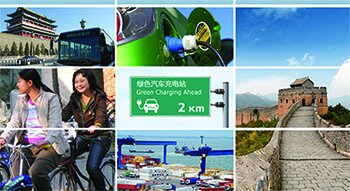 On behalf of the German government GIZ supports Chinese institutions in developing sustainable low carbon transport systems. In China, transport accounts for almost one fifth of total carbon emissions, challenging its sustainable development. But China is stepping up to the challenge of rapid motorization and urbanization and is committed to take efforts to limit the growth of its greenhouse gas (GHG) emissions. In implementing low carbon transport interventions China can, at the same time, achieve additional sustainability benefits, such as better air quality, reduced congestion and improved road safety.
On behalf of the German government GIZ supports Chinese institutions in developing sustainable low carbon transport systems. In China, transport accounts for almost one fifth of total carbon emissions, challenging its sustainable development. But China is stepping up to the challenge of rapid motorization and urbanization and is committed to take efforts to limit the growth of its greenhouse gas (GHG) emissions. In implementing low carbon transport interventions China can, at the same time, achieve additional sustainability benefits, such as better air quality, reduced congestion and improved road safety.
Established in 2010, the Sustainable Transport team of GIZ in China focuses on the development of a low carbon transport system based on five pillars:
• carbon accounting and emission evaluation
• climate protection and energy efficiency strategies
• electro-mobility and alternative fuels
• green freight logistics and
• sustainable urban transport
We aim to assist our Chinese partners in the design and implementation of measures, strategies and universal standards for climate change mitigation, energy efficiency and environmental protection in China’s transport sector. An important cross-cutting theme in our work is the monitoring and assessment of greenhouse gas emission reduction potentials.
The sustainable transport programme engages in policy dialogues with decision makers from relevant government departments. In partnership with our Chinese counterparts we develop policy recommendations based on scientific research, best practice reviews and expert advisory. We use workshops and study tours to identify feasible solutions and encourage mutual learning. GIZ brings together Chinese and international experts to discuss scenarios for China’s future development.


